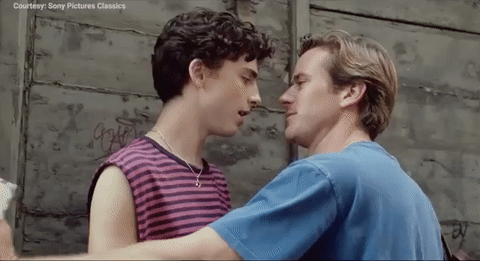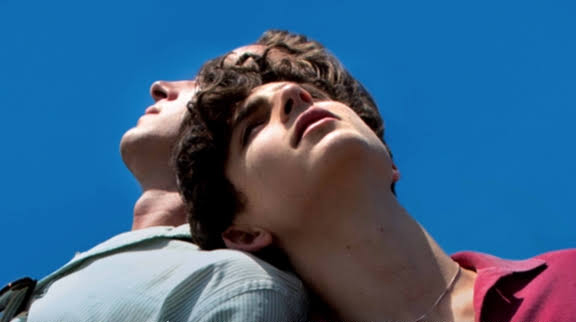Call Me By Your Name, the break-out indie hit directed by Luca Guadagnino and based on the novel by André Aciman, will undoubtedly become a classic in the queer film canon, and perhaps also in the coming-of-age canon. But what about in the Jewish film canon?
The Jewishness of these characters, although subtle, ripples as a steady undercurrent throughout the movie, coloring their identities and compounding their otherness, and in many ways, bringing the two main characters together.
The film explores the relationship between teenager Elio Perlman (Timothée Chalamet) and 20-something Oliver (Armie Hammer). Oliver, a tall and athletic and almost unbearably handsome post-doctoral student, is staying with the Perlmans in their idyllic home in Northern Italy for the summer while he assists Mr. Perlman, his professor, on his research.
The film viscerally captures the electric, bittersweet moments of finding and then losing one’s first love. As Elio watches Oliver — dancing with someone else, reading by the pool, riding his bicycle — we are following that gaze, not only entranced by the sheer physicality of Oliver but also reminded of how easy it is, at age 17, to pin all of your unfulfilled desires onto someone else.
Of note, one of the first things that interests Elio in Oliver is their shared Jewishness. Oliver reps his heritage proudly, always wearing a Star of David necklace. Elio is surprised at first to learn that Oliver is Jewish; Elio tells Oliver that his family, on the other hand, are “Jews by discretion.” (Both actors are also Jewish: Chalamet on his mother’s side and Hammer on his father’s.) In this way, Judaism becomes an interesting counterpoint to queerness: While Oliver literally wears his Jewishness around his neck, the Perlmans are far less public about their Jewish identity. But the two are quite the opposite when it comes to their sexuality: While Elio takes an exploratory approach to his interest in Oliver, Oliver is secretive about his queerness in the way that the Perlmans are about their Judaism.

There’s a transformation here, though, in the Perlmans’ relationship to Jewishness. About halfway through the film, Elio begins to wear his Star of David necklace, too, perhaps because Oliver’s pride over his identity allowed Elio entrée into his. Or, simply, he does it as a way to impress the man. Nonetheless, the symbolism there isn’t lost on us.
It’s not insignificant that the last scene of the film takes place over Hanukkah, at the same home in Italy, now covered in snow. (Warning: spoilers ahead.) We see all of the Perlmans lighting the Hanukkah candles, and the bittersweet last scene is a single take of Elio staring at the fire after learning that Oliver is engaged to be married to a woman, while his mother and the housekeeper set up the table for a formal Hanukkah dinner. While the film shows us how Elio and his parents embrace their Judaism by the end of the film, Oliver cannot do the same with his queerness.
There’s little shame on Elio’s part for loving who he does. The sense that they’re doing something “wrong” all comes from Oliver: older, perhaps with more experience in clandestine homosexual relationships, and with, he hints at one point, conservative, homophobic parents. The film takes place in 1983, when it wasn’t so uncommon for even liberal American academics to stay closeted. (One can almost envision Oliver’s trajectory: staying in a loveless marriage, having a couple of kids, and then, in the Obama years, or after his parents die, finally feeling safe enough to come out. But of course at that point, Elio will have been living openly for decades, having had dozens more lovers and heartbreaks and living a million more lives than Oliver ever did.)
Elio’s unabashed feelings for Oliver are in many ways thanks to his parents, and I saw this film, more than anything else, as the picture of ideal parenting. Mr. and Mrs. Perlman (Michael Stuhlbarg and Amira Casar) are supportive but not cloying, intellectually engaging but not demanding of Elio’s talents. They encourage what he’s good at and don’t expect him to be something he’s not. In many ways, they subvert the stereotype of Jewish parents — especially mothers — that we so often see represented in pop culture: overbearing, possessive, infantilizing, nosy. Even after they catch wind of Elio’s feelings for Oliver, they never pry into the details or attempt to put a label on Elio’s sexuality. They simply tell him, in a sweet scene in which Elio lies in his father’s lap while his mother reads a German fairy tale aloud, that they are always there for him if he wants to talk.
Towards the end of the film, they even suggest that Elio go to the city with Oliver before he flies home to America, fully aware that they’re encouraging their teenage son’s romantic tryst with an older man. This liberalism in parenting is partially European in nature, but it’s also a refreshing and important representation of the Jewish family. We need to see more Jewish parents in films and television that give their children freedom rather than constrict their options.
The film speaks to the ability of shared otherness to create bonds between people. Here, in the middle of Italy in 1983, a deeply Catholic country, are four Jews, nonverbally tied together by their shared heritage. One might go so far to say that Elio’s attraction to Oliver, which begins their whole relationship, is tied up in Oliver’s pride in his Jewishness, his confidence in being who he is — at least, in one capacity. Oliver can’t embrace his queerness in the same way, but the compounding of the two identities — queer and Jewish — ends up being an important one for Elio, who, by the end of the film, seems far more comfortable with himself than Oliver will ever be.



